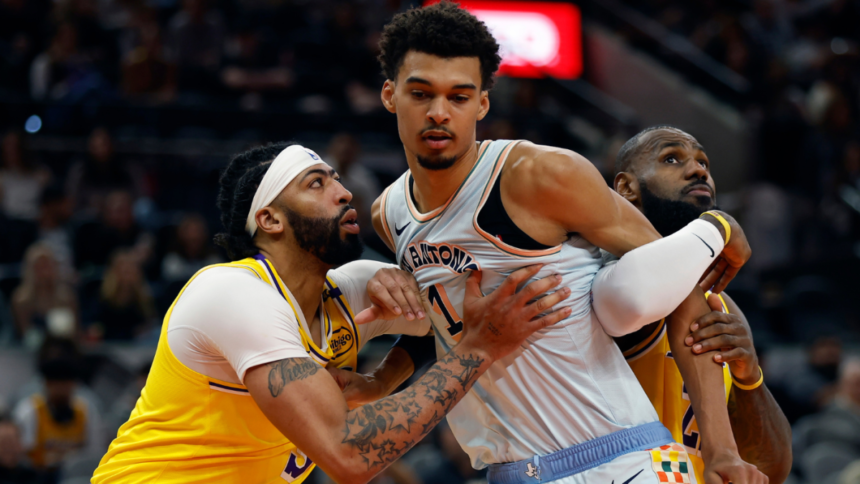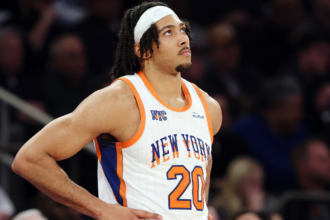
Anthony Davis thinks he should have won a Defensive Player of the Year award by now, and he’s getting increasingly vocal about that fact. In April of 2024, the Lakers star grumbled that the league had a bias against him. “I’ll never get [Defensive Player of the Year],” Davis said at the time. “They’re not giving it to me. The league doesn’t like me. I’m the best defensive player in the league. I can switch 1 through 5. I can guard the pick-and-roll the best in the league, from a big standpoint. I block shots. I rebound.”
In December, he argued that he’s not being judged on the same standard as others. “I think the goal post just moves sometimes,” Davis told Melissa Rohlin of Fox Sports. “Some guys throughout the years have been awarded Defensive Player of the Year because they had the most blocks in a season. I’ve done that a couple of times and haven’t gotten it. Or is it about team defense? Or is it about individual defense and what numbers do you have on the defensive end?”
Has Davis deserved a Defensive Player of the Year award in the past? Well, there’s no clear cut answer to that question. He came closest to winning it in 2020, when his Lakers won the championship and he was the runner-up to Giannis Antetokounmpo. The numbers favored Antetokounmpo in the moment, but it was a reasonable debate. His only other top-three finish came in 2018, when he finished third. A struggle Davis has faced in these conversations has been his team support. Defensive Player of the Year almost always goes to a player on a top-five defense, but Davis has mostly spent his career lifting up bad defensive rosters, not enhancing great ones. There is a valid argument to be made for the idea that Davis has not gotten enough credit for his defense over the course of his career.
His latest quote on the subject, though, is emphatically refutable. In a recent interview with ESPN’s Shams Charania, Davis indicated that the reason Victor Wembanyama has run away with this year’s Defensive Player of the Year race (sportsbooks have the Spurs star as a heavy favorite) has been a narrative, not his performance. “I feel the narrative is being pushed for Wemby to get it, right,” Davis told Charania. “He’s averaging, what, like four blocks or something crazy like that, but then it goes back to, are we talking about just blocks? I don’t know how anything works anymore.”
Now, in fairness, Davis did not directly state that he is the deserving winner. By arguing that a narrative is pushing Wembanyama, though, he implies that the San Antonio star is not. Well, in reference to Davis saying he doesn’t know how anything works anymore, here’s how Defensive Player of the Year is working this year: the best defender is going to win it. Line Wembanyama’s defensive numbers up next Davis’ and it’s no contest. Wembanyama is the superior defender, and by most metrics, the most impactful in all of basketball.
|
Blocks per game |
3.9 |
2.2 |
Wembanyama |
|
Steals per game |
1.1 |
1.3 |
Davis |
|
Contested shots per game |
10.9 |
10 |
Wembanyama |
|
Deflections per game |
3.1 |
2.3 |
Wembanyama |
|
FG% allowed within six feet of the rim |
49.8% |
54.3% |
Wembanyama |
|
Defensive Win Shares |
2.5 |
2.3 |
Wembanyama |
|
D-BPM |
3.2 |
1.2 |
Wembanyama |
|
D-EPM |
3.0 |
1.7 |
Wembanyama |
|
D-LEBRON |
2.38 |
1.43 |
Wembanyama |
|
Team defensive rating on/off differential |
+6.7 |
-0.3 |
Wembanyama |
None of this is meant to undermine the defensive performance Davis has put on this season. Most of the numbers in his column are quite strong, and while the Lakers rank 22nd in defense, that is mostly because of their ghastly group of perimeter players rather than anything Davis is doing near the basket. In a normal year, numbers like the ones Davis has put up could get a player in the running to win Defensive Player of the Year provided they come in the right team ecosystem. The same is true of many of the seasons Bam Adebayo, who has also complained about moving goalposts when it comes to this award, has put up recently.
But we’re well beyond normal at this point. Wembanyama is something entirely new, by far the NBA’s best defensive player at the ripe old age of 21 and only getting better with each passing game. At this rate, it seems as though the award will be his to lose in any season in which he plays at least 65 games moving forward. In all likelihood, that means Davis, Adebayo and a whole lot of other great modern defenders will retire without a trophy.
While that may not be a narrative fabrication, it does say something about the system in which these trophies are awarded. Davis has been a far better playoff defender than four-time Defensive Player of the Year Rudy Gobert, for instance, but the league has no current method of acknowledging that beyond, well, championship rings. This isn’t to discount Gobert’s wins either. Under the current system, meant to measure a player’s defensive value across an 82-game regular-season sample, he has been deserving of his awards. But lacking an adequate way to honor what players like Davis and Adebayo have accomplished is a shortcoming in the structure of the awards system.
At least they’re in good company when it comes to lacking a Defensive Player of the Year trophy. Tim Duncan and Scottie Pippen are almost universally regarded as the best defenders of their era, at least at their respective positions. Neither won the award. Both watched lesser players do so. But lacking that, single accolade hasn’t diminished either of their legacies. We can still remember Davis and Adebayo as all-time defenders even if Wembanyama ensures they retire with empty trophy cases. Given Wembanyama’s rise, both should start making peace with that possibility. This is his award now, and not because of some contrived narrative. He is the NBA’s best defender. Everyone else is competing for second place.







